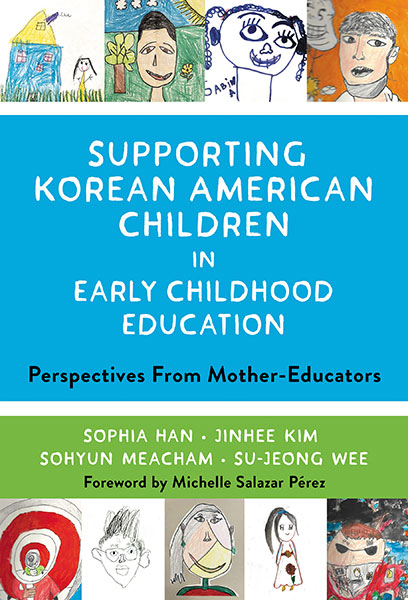Professors: Request an Exam Copy
Print copies available for US orders only. For orders outside the US, see our international distributors.
Sophia Han, Jinhee Kim, Sohyun Meacham, Su-Jeong Wee
Foreword by: Michelle Salazar Pérez
Publication Date: November 24, 2023
Pages: 128
Series: Early Childhood Education Series

2024 National Association for Multicultural Education (NAME) Philip C. Chinn Multicultural Book Award
Early childhood professionals can use this one-of-a-kind work to better serve Korean American and other Asian American children in the United States. Four transnational mother-educators share the lived experiences of Korean American children and their families through candid and vivid narratives that counter stereotypical and prejudicial beliefs about these communities. Topics include parenting beliefs and practices, naming practices, portrayals in children’s picturebooks, translingual home practices, and responses to microaggressions. The text raises awareness about various dynamics within the Korean American community for a more nuanced discourse. The authors bring a wealth of hybrid positioning and experiences as former early childhood educators, first-generation Korean American immigrants, current teacher educators working with pre- and inservice teachers, and researchers in different states, as well as mothers of second-generation children.
Book Features:
Sophia Han is an associate professor in the Department of Curriculum, Instruction, and Learning at the University of South Florida. Jinhee Kim is an associate professor in the Department of Elementary and Early Childhood Education at Kennesaw State University, Georgia. Sohyun Meacham is an associate professor in the Department of Curriculum and Instruction at the University of Northern Iowa. Su-Jeong Wee is an assistant professor in the Department of Child and Family Studies at California State University, Los Angeles.
“This book is a groundbreaking volume that is dynamic in its approach and in what it conveys. The authors, Sophia Han, Jinhee Kim, Sohyun Meacham, and Su-Jeong Wee, write from their embodied knowings as Korean mother-scholars, providing readers with an introspective view of their everyday lived experiences in the United States . . . Through storytelling, dialogic narratives, and artistic expressions, the authors share their individual and collective encounters and their children’s experiences navigating the oppressive terrains of early childhood education and care, and other social spheres.”
—From the Foreword by Michelle Salazar Pérez, Velma E. Schmidt Endowed Chair for Early Childhood Education, University of North Texas
“Amidst alarming bouts of hatred towards Asian American people, four Korean American mother-scholars created a space to make sense of their lived experiences through Suda, a richly emotive and reflective ethnomethodology. The result is a book that provides detailed perspectives on contemporary Korean American parenting practices, home–school relationships, culturally responsive curriculum, teaching, and translanguaging. Supporting Korean American Children in Early Childhood Education is a gift to educators of young children and a must-read for the educational community.”
—Melissa Sherfinski, associate professor of early childhood and elementary education, West Virginia University and chair, Early Education and Child Development Special Interest Group (SIG), AERA
“This book is an exceptionally rare exploration of Asian American mothers and their children. As Korean American mothers, teacher educators, and scholars, the authors courageously and truthfully share their own lived experiences, as well as those of their children, within U.S. schools, higher education institutions, and communities. Not only do they provide valuable instructional strategies and resources for educators, but they also offer indispensable insights into the distinctiveness and diversity of Asian American children and their families. This book is a must-read for anyone seeking a deeper understanding of this rich and nuanced aspect of Asian American life and those interested in antiracist practices.”
—Kyunghwa Lee, professor, University of Georgia
“This book offers a profound exploration of Korean American children and families, drawing from personal stories shared by the authors who are early childhood educators and researchers. The integration of these personal stories with educational pedagogies makes for a distinctive approach, allowing readers to grasp the essence of the book easily. With its reader-friendly style, the book encompasses diverse perspectives that cultivate a deeper understanding of Korean American families. Early childhood educators and researchers working with Korean American communities will find this book to be a valuable resource.”
—Myae Han, professor, University of Delaware
Contents (Tentative)
Acknowledgments
Foreword
1. Our Stories Through Suda (수다 )
Introducing Suda (수다)
Our Background and Her-Stories
Our Positioning as Korean American Transnational Mother-Educators
Looking Ahead
2. Parental Ethnotheories Raising Korean American Children
Cultural and Historical Parenting: Tea-Kyo
Developmental Markers in Context: An Example of Sleep Training
Social-Emotional Lessons: Balancing Multiple Expectations
Disrupting a Tiger Mom Stereotype: We Are So Much More
Implications and Resources
3. “What’s Your Name?”: Children’s Names and Naming Practices
Children’s Names With Family and Cultural Values
Juggling Concerns and Desires to Decide on Our Children’s Names
Naming Practices by Others
Children’s (Trans)Naming Practices
“Hello, My Name is . . .”: Rethinking Preferred Names in School
Implications and Resources
4. “I Don’t See Me!”: Picture Books About Asian Americans
Scarcity of Children’s Picture Books on Asian American: Underrepresentation
“Not All Koreans Are Same”: Misrepresentation and Within-Group Differences
Perpetuating the Tourist Approach to Asian Culture
Implications and Resources
5. More Than English: Diverse Translingual Practices in Korean American Transnational Families
The Value of Heritage Language Learning and Our Children’s Experiences
“Do Your Children Speak Korean?”: Microaggressions Based on Language and the Perpetual Foreigner Image of Asian Americans
Challenging the Hegemony of English and Promoting Translanguaging Pedagogy
Implications and Resources
Chapter 6. Navigating Invisibility and Microaggressions as Korean American Children and Families
“Where are the Asians?”: Our Children’s Experiences of Marginalization and Invisibility
Our Children’s Experiences of Being Visible: Microaggressions and Racial Bias
From Guilty Parents to Active Advocates
Implications and Resources
Departing Thoughts about Our Suda (수다) and Supporting All American Children
Appendix
References
Index
About the Authors
2025 Society of Professors of Education (SPE) Outstanding Book Award Honorable Mention
2024 NAME Philip C. Chinn Multicultural Book Award
Professors: Request an Exam Copy
Print copies available for US orders only. For orders outside the US, see our international distributors.